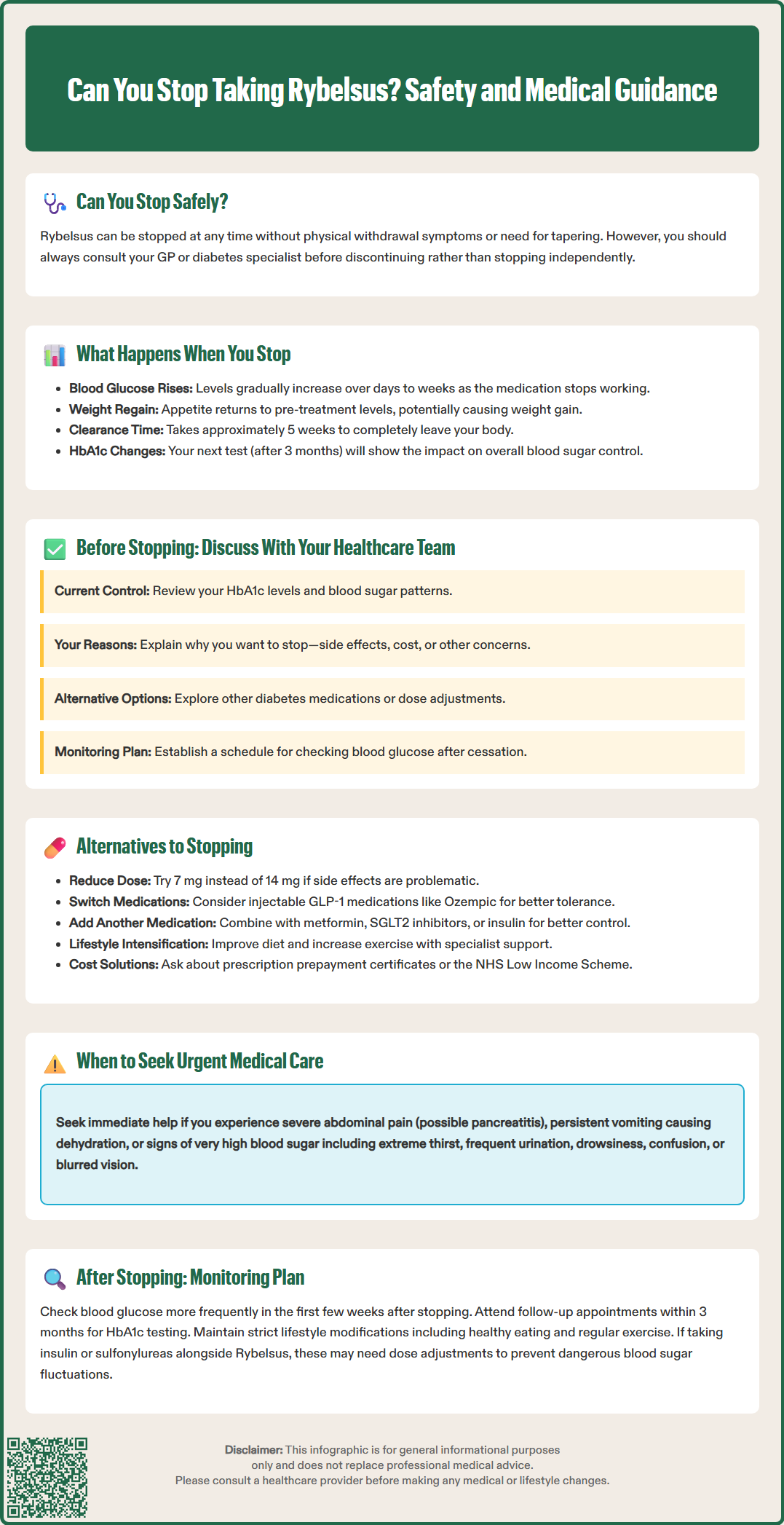
Rybelsus (semaglutide) is an oral GLP-1 receptor agonist licensed for type 2 diabetes management in the UK. Whilst you can physically stop taking Rybelsus at any time without withdrawal symptoms, discontinuation should ideally be discussed with your GP or diabetes specialist. Stopping this medication may lead to rising blood glucose levels within days to weeks, potentially increasing your risk of diabetic complications. This article examines the safety considerations, physiological effects, and medical guidance surrounding Rybelsus discontinuation, alongside alternatives that may address your concerns whilst maintaining effective diabetes control.
Quick Answer: You can stop taking Rybelsus without physical withdrawal effects, but discontinuation should be medically supervised as blood glucose levels typically rise within days to weeks, increasing the risk of diabetic complications.

Mounjaro® is the most innovative GLP-1 medication proven to dramatically curb appetite, hunger, and cravings to help professional men achieve substantial weight loss.
Start Here
Wegovy® is a weekly injectable GLP-1 medication with proven effectiveness in reducing appetite, hunger, and cravings to help busy professionals lose significant weight.
Start HereRybelsus (semaglutide) is an oral glucagon-like peptide-1 (GLP-1) receptor agonist licensed in the UK for the treatment of type 2 diabetes mellitus. Whilst you can physically stop taking Rybelsus at any time, the decision to discontinue this medication should ideally be made in consultation with your GP or diabetes specialist rather than independently.
Unlike some medications that require gradual dose reduction to prevent withdrawal symptoms, Rybelsus does not typically cause physical dependence or withdrawal effects when stopped. However, discontinuation may lead to a gradual return of elevated blood glucose levels over days to weeks, potentially increasing the risk of diabetic complications. The MHRA product information does not mandate a specific tapering schedule, but clinical judgement should guide the decision-making process.
Key considerations before stopping include:
Your current glycaemic control and HbA1c levels
Reasons for wanting to discontinue (side effects, cost, lifestyle changes)
Availability of alternative diabetes management strategies
Cardiovascular risk profile and weight management goals
If you are experiencing troublesome side effects such as persistent nausea, vomiting, or gastrointestinal disturbance, these may improve with dose adjustment rather than complete cessation. Similarly, if cost or access issues are driving your decision, your healthcare team may be able to suggest alternative solutions within the NHS framework. Never stop taking Rybelsus without discussing your concerns with a healthcare professional, as uncontrolled diabetes can lead to serious complications including cardiovascular disease, neuropathy, and retinopathy.
Seek urgent medical attention if you experience severe or persistent abdominal pain, vomiting that prevents adequate hydration, or symptoms of severe hyperglycaemia (extreme thirst, frequent urination, drowsiness, confusion).

When you discontinue Rybelsus, the medication's effects on glucose regulation and appetite suppression will gradually diminish as the drug is eliminated from your system. Semaglutide has a half-life of approximately one week according to the MHRA product information, meaning it takes roughly five weeks for the medication to be completely cleared from the body. However, you may notice changes in your blood glucose levels and appetite within days to weeks of stopping.
Glycaemic control is typically affected as the medication's effects wane. Rybelsus works by enhancing insulin secretion in response to meals, suppressing glucagon release, and slowing gastric emptying. Without these mechanisms, your blood glucose levels may rise, particularly post-prandially (after meals). Individual responses vary considerably, but changes in glycaemic control will often be reflected in your next HbA1c test (typically performed after 3 months).
Weight changes are another common consequence of discontinuation. Many patients experience weight loss whilst taking Rybelsus due to reduced appetite and delayed gastric emptying. When these effects cease, appetite typically returns to pre-treatment levels, and some weight regain is frequently observed. The extent of weight regain varies between individuals and can be influenced by ongoing lifestyle modifications.
Cardiovascular considerations are also important when stopping Rybelsus. While oral semaglutide (Rybelsus) has demonstrated cardiovascular non-inferiority in the PIONEER-6 trial, it has not shown superiority for major adverse cardiovascular events reduction. If Rybelsus was part of your overall diabetes management strategy, your healthcare team should reassess your cardiovascular risk profile when the medication is discontinued and consider whether alternative therapies are needed.
The process of stopping Rybelsus should be structured and medically supervised to ensure your diabetes remains well-controlled and to minimise potential complications. NICE guidance (NG28) emphasises individualised diabetes management, and any changes to your treatment regimen should be made collaboratively with your healthcare team.
Before discontinuation, your clinician should:
Review your current HbA1c and assess whether glycaemic targets are being met
Evaluate your reasons for wanting to stop (adverse effects, personal preference, clinical appropriateness)
Discuss alternative treatment options if diabetes control is likely to deteriorate
Establish a monitoring plan for blood glucose levels after cessation
If you are stopping due to intolerable side effects, your doctor may first attempt dose reduction (e.g., from 14 mg to 7 mg) to improve tolerability. Gastrointestinal adverse effects often diminish over time, and persevering for 4–8 weeks may allow adaptation. However, if side effects remain unacceptable, discontinuation is entirely reasonable.
It's important to note that Rybelsus must be taken according to specific instructions: on an empty stomach in the morning with up to 120 ml of water, waiting at least 30 minutes before consuming food, drink, or other oral medicines. The tablet should be swallowed whole and not split or crushed. These administration requirements cannot be modified to improve tolerability.
For patients stopping Rybelsus whilst maintaining good glycaemic control through lifestyle modifications alone, close monitoring is essential. You should:
Check your blood glucose levels more frequently in the first few weeks (as advised by your diabetes team)
Attend follow-up appointments for HbA1c testing within 3 months
Maintain or intensify dietary modifications and physical activity
Contact your GP promptly if you experience symptoms of hyperglycaemia (increased thirst, frequent urination, fatigue, blurred vision)
If you are taking Rybelsus alongside insulin or sulfonylureas, these medications may need dose adjustments when Rybelsus is stopped to prevent hypoglycaemia or hyperglycaemia.
Seek urgent medical help if you develop severe abdominal pain (which could indicate pancreatitis), persistent vomiting leading to dehydration, or severe hyperglycaemia. Contact NHS 111 or your GP for immediate advice in these situations.
Before discontinuing Rybelsus entirely, several alternatives may address your concerns whilst maintaining effective diabetes management. The optimal approach depends on your specific reasons for considering cessation and your overall clinical picture.
If side effects are the primary concern:
Dose adjustment: Reducing to a lower maintenance dose (7 mg rather than 14 mg) may improve tolerability whilst retaining some glycaemic benefit
Slower titration: If restarting after a break (which should only be done under medical supervision), following the recommended titration schedule may improve tolerance
Alternative GLP-1 receptor agonists: Injectable formulations such as Ozempic (subcutaneous semaglutide) or dulaglutide may have different side effect profiles
Remember that Rybelsus must always be taken on an empty stomach in the morning with up to 120 ml of water, waiting at least 30 minutes before any food, drink, or other oral medicines. The tablet must be swallowed whole.
If glycaemic control is inadequate:
Rather than stopping, combination therapy may be more appropriate. NICE recommends considering dual or triple therapy for type 2 diabetes when monotherapy fails to achieve HbA1c targets. Options include adding metformin, SGLT2 inhibitors (such as dapagliflozin or empagliflozin), or basal insulin depending on individual patient factors including cardiovascular and renal status. According to NICE guidance (NG28), GLP-1 receptor agonists like Rybelsus should not be used in combination with DPP-4 inhibitors.
If cost or access is problematic:
Discuss with your GP whether alternative formulations or medications might be more accessible within the NHS. Options may include prescription prepayment certificates, the NHS Low Income Scheme, or consideration of local formulary alternatives. Generic alternatives are not yet available for semaglutide in the UK, but other diabetes medications may offer comparable benefits at lower cost.
Lifestyle intensification represents another alternative to medication discontinuation. Working with a diabetes specialist nurse or dietitian to optimise nutrition, increase physical activity, and achieve weight loss targets may improve glycaemic control sufficiently to reduce medication burden. However, this approach requires significant commitment and regular monitoring to ensure diabetes remains well-controlled throughout the process.
If you experience any suspected side effects from Rybelsus, report them via the MHRA Yellow Card scheme (yellowcard.mhra.gov.uk or the Yellow Card app).
No, Rybelsus does not require gradual tapering as it does not cause physical withdrawal symptoms. However, you should consult your GP or diabetes specialist before stopping to ensure appropriate monitoring and alternative diabetes management strategies are in place.
Rybelsus has a half-life of approximately one week, meaning it takes roughly five weeks for the medication to be completely eliminated from your body. However, you may notice changes in blood glucose levels and appetite within days to weeks of stopping.
Discuss side effects with your GP before stopping, as dose reduction may improve tolerability. Report suspected side effects via the MHRA Yellow Card scheme, and seek urgent medical attention for severe abdominal pain, persistent vomiting, or symptoms of severe hyperglycaemia.
All medical content on this blog is created based on reputable, evidence-based sources and reviewed regularly for accuracy and relevance. While we strive to keep content up to date with the latest research and clinical guidelines, it is intended for general informational purposes only.
DisclaimerThis content is not a substitute for professional medical advice, diagnosis, or treatment. Always consult a qualified healthcare professional with any medical questions or concerns. Use of the information is at your own risk, and we are not responsible for any consequences resulting from its use.